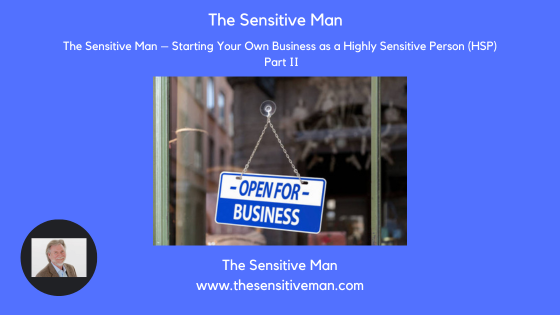|
A Blog about Sensory Processing Sensitivity from the Worldview of a High-Sensing Male
Total words 791, Time to read: 3 minutes 19 seconds Starting Your Own Business as a Highly Sensitive Person (HSP) For Highly Sensitive People (HSPs), the entrepreneurial path offers a unique opportunity to create a business environment that aligns perfectly with their sensitivity and strengths. This approach allows HSPs to control their work setting, pace, and interactions, tailoring their business to suit their deep processing needs and empathetic nature. However, starting a business requires careful planning, strategic thinking, and accessing the right resources. This blog will guide HSP entrepreneurs through finding the right business fit, conducting market research, writing a business plan, and leveraging available resources and support. Finding the Right Business Fit Brainstorming Business Ideas: For HSPs, the best business ideas often stem from personal passions or problems they wish to solve, which resonate deeply with their values and sensitivity. Begin by listing activities or areas where you naturally excel and feel deeply involved, such as creating art, counseling, or environmental conservation. Consider how these passions could translate into a viable business that satisfies a market need and aligns with your temperament and lifestyle needs. Next, evaluate how these ideas fit with your sensitivity. For example, if you are particularly affected by the emotions of others, a business that minimizes direct conflict, such as a behind-the-scenes art restoration service, might suit you better than a high-stress sales environment. Exploring Established Paths: Franchising or purchasing an existing business can be excellent options for HSPs. These paths provide a structured business model and an established brand, which can reduce the stress and uncertainty of starting from scratch. Investigate franchises or businesses for sale that match your identified interests and evaluate how their required day-to-day operations align with your sensitivity. Market Research and Business Planning Conducting Market Research: Understanding the market is crucial to ensuring the viability of your business idea. Start by identifying your target customers and learning as much as you can about their needs, preferences, and buying behaviors. Use online surveys, focus groups, or one-on-one interviews to gather data. This step is vital for HSPs, as it helps confirm demand for your product or service, which can alleviate anxiety over the business's potential success. Look at competitors in your chosen niche. What are they offering, and how can you differentiate your business? As an HSP, your unique perspective on customer care, product design, or service delivery can be a significant differentiator. This would be a good time to understand the SWOT (Strengths, Weaknesses, Opportunities, and Threats) analysis methodology to compare your proposed businesses with other established companies. Writing a Business Plan: Your business plan should be a comprehensive document that outlines your business idea, market research findings, operational structure, and financial projections. For HSPs, it's essential to balance realism with your unique perspective. Incorporate your strengths, such as attention to detail and empathy, as key elements in your business strategy, especially in customer service and team management. Do an online search for Business Plan templates to aid you in developing your plan. A solid business plan will also address potential stress points and outline strategies for managing them, ensuring they are aligned with your need for a supportive work environment. Resources and Support Accessing Business Resources: Numerous resources are available to help aspiring HSP entrepreneurs. Organizations like SCORE (in the U.S.) offer free mentoring from experienced business professionals and can provide guidance tailored to the sensitive nature of HSPs. SCORE mentors can assist in refining your business idea, developing your business plan, and navigating the early stages of business setup. Government aids, such as the Small Business Administration (SBA), provide tools for business planning, financial assistance programs, and guides on legal requirements for starting a business in your area. Utilizing these resources can reduce the feeling of overwhelm and provide clear steps to follow. Also, check regional, state, and local governments for help in your area. Websites and Online Resources: Several online platforms can be invaluable in the early stages of business formation. Websites like Entrepreneur.com and Inc.com offer articles, tips, and insights into starting and running a business. For HSP-specific advice, look for forums and websites catering to sensitive entrepreneurs, offering community support, and understanding the unique challenges HSPs face in the business world. Conclusion Starting a business as an HSP can be a fulfilling path to professional independence and personal satisfaction. By leveraging your innate strengths, conducting thorough market research, and accessing the right resources and support, you can create a business that succeeds in the market and supports your well-being as a highly sensitive person. Remember, the key to a successful business venture for an HSP lies in aligning your business practices with your sensitivity, ensuring that your professional environment enhances your personal and business potential. In Part III, we talk about launching and growing your business.
0 Comments
Leave a Reply. |
AuthorBill Allen currently lives in Bend, Oregon. He is a certified hypnotist and brain training coach at BrainPilots.com. He believes that male sensitivity is not so rare, but it can be confounding for most males living in a culture of masculine insensitivity which teaches boys and men to disconnect from their feelings and emotions. His intent is to use this blog to chronicle his personal journey and share with others. Archives
July 2024
Categories
All
|


 RSS Feed
RSS Feed
